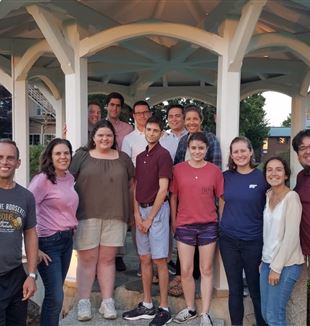
Scala: Life is Here and Now
José writes about his experience participating in the Scala Foundation's summer seminar, "Rediscovering Integral Humanism," with Princeton's Margarita Mooney who last spring presented The Life of Luigi Giussani in New York.Our journey begins in Portsmouth, Rhode Island. It’s the last week of June. As we step outside, we are greeted by the beautiful green grass. The sun is blazing, and the humidity sticks to our skin. The gentle waves in the sea not far away now ebb and flow with an irresistible charm as we walk down to the shore. We skip stones and slowly tiptoe for a dive in the cold Atlantic Ocean. Eventually, what started as a relaxing swim ends up as an improvised but fierce water polo match. Now refreshed, and after a quick shower, we get back together and sit down facing each other. We pull out our notebooks and our assigned reading for that afternoon: Chapter 6 of Augusto del Noce’s Crisis of Modernity, “Toward a New Totalitarianism.” For a little more than a week at this point, our days have been spent in this unique dichotomy: the intense intellectual discussions go hand in hand with time reserved for shared leisure, or otium. This is the Scala Foundation’s third annual Summer Seminar: “Rediscovering Integral Humanism.”
The seminar is led by Dr. Margarita Mooney, a professor at the Princeton Theological Seminary who is also the founder of Scala Foundation. Margarita is the driving force that guides the discussions, not by lecturing us on these topics but by allowing us to speak openly and state our opinions and remarks. It is especially over mealtimes that our discussions come alive. A conversation on the consequences of Paulo Freire’s pedagogy could start at the self-service line in the dining hall, then, as we take a bite of the fried chicken, the topic shifts to an explanation of what we exactly mean by the term “divine immanence,” followed by a rant on the limitations of the American dessert industry as we consume a suspiciously artificial banana pudding. It is a whole, living experience. Coming from varying cultural backgrounds, each participant brings different opinions on a wide range of topics, which also opens an opportunity for deep and enriching new friendships.
I had gone through a similar experience in a philosophy course I took last year on Augustine’s Confessions. Here, the professor spent almost the full semester replicating Augustine’s path not by simply describing the author’s ideas but by targeting our own lives, questioning our most basic assumptions: “Are we really free or are we in fact led by our passions? Can we really love someone or are we primarily selfish in our relationships?” At certain points in these classes one could feel the frustration and disbelief in the faces of some students as they were unable to deal with witnessing such a challenge to their life’s principles. Yet, these questions were not left unanswered, and as a sign of a great teacher, the answers were not given, but discovered. Both here and in the Scala Seminar, by challenging us to think deeper about our lives, reaching the consequences of our logical reasoning, the role of the teacher is to guide us through a personal, living experience of discovery and not simply an intellectual clarification.
What is this discovery? As Augustine states at the beginning of the Confessions: “Our heart is restless until it rests in You.” Only by recognizing his own restlessness can Augustine fully understand how the love of God can save him. The same is true for us. This experience of insufficiency is something we must make our own in order to understand how God saves us: if Christianity is the answer, then what is the question? Similarly, the end of education is not simply to learn a technique or to acquire a great amount of knowledge; It is true flourishing as a human being, as Man made in the image of God.
This is not only fourth-century Augustinian wisdom. Giussani writes in The Risk of Education: “I think it is a crime to perceive, propose and live one’s faith as if it were a premise that is not followed through, a premise that has nothing to do with life. By life I mean life today, because yesterday’s life is gone and tomorrow’s life does not yet exist. Life is the here and now. I even tell my students that whatever is irrelevant to my current experience and does not touch my life now simply does not exist. It follows that a God that is not relevant to what I am living and experiencing today is an irrelevant God. He is not there, He is a God who is missing, a Christ who is missing, a body of Christ who is not there. He might exist in the head of the theologians, but not in me, he can’t exist in me.” (Introduction to the 1995 edition)
In these past days in Portsmouth, Christ was not only in the heads of future theologians, philosophers or teachers, but was tangibly present in the beauty of nature and new friendships.
José, Portugal